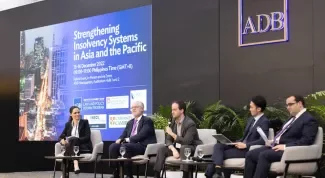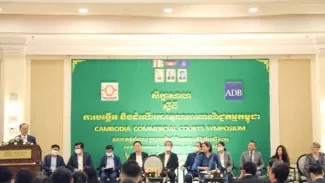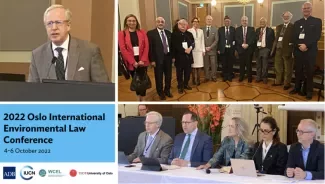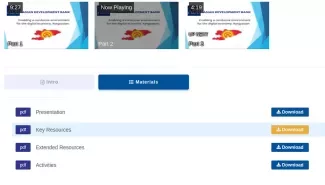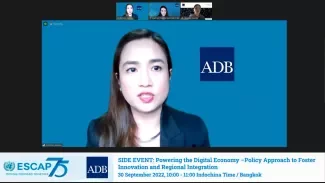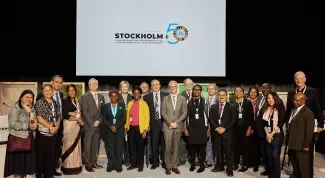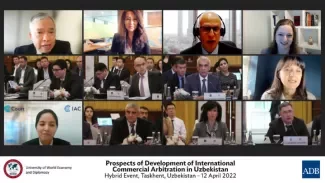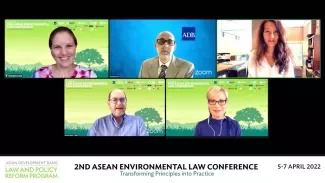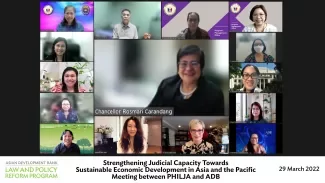News
Asian Development Bank and Partners Host Conference to Strengthen Insolvency Systems in Asia-Pacific
The Asian Development Bank partnered with INSOL International, Singapore Management University, The University of Cambridge's Centre for Corporate and Commercial Law, and The University of Chicago's Center on Law and Finance to host a hybrid conference: Strengthening Insolvency Systems in Asia and the Pacific in Manila, Philippines on 15-16 December 2022 to analyze how countries in the region can strengthen insolvency and restructuring frameworks.
ADB Convened Cambodia’s First Commercial Courts Symposium
ADB and the Ministry of Justice held Cambodia’s first-ever Commercial Courts Symposium on operationalizing effective and efficient commercial courts. The Symposium convened over 120 senior government officials, judges, business leaders and international experts to exchange knowledge about experiences and lessons learned in developing commercial courts around the world.
ADB Presents at Oslo International Environmental Law Conference
ADB General Counsel Thomas Clark, ADB Law and Policy Program team, and leading Asian judges and academics were invited to the Oslo International Environmental Law Conference to showcase significant innovations in jurisprudence and environmental law education in the Asia-Pacific region.
ADB, Kyrgyz Republic, CAREC Institute Developed Online Training on E-Commerce
ADB Office of the General Counsel, through its Law and Policy Reform Program, and the Ministry of Economy and Commerce of the Kyrgyz Republic, in collaboration with Central Asia Regional Economic Cooperation (CAREC) Institute, have developed and completed an online training course on e-commerce designed with a view to inform and provide tools to government officials, entrepreneurs, and businesses to enable them to connect to
ADB Presented on Enabling a Conducive Environment for the Digital Economy at the Virtual Side Event of UN ESCAP's Third Ministerial Conference
Gretchen Aquino of the Asian Development Bank's Office of the General Counsel participated in the panel discussion at the virtual side event at the UN ESCAP Third Ministerial Conference on Regional Cooperation and Integration in Asia and the Pacific.
Asian Development Bank convenes global environmental leaders at Stockholm+50 Conference
Thomas Clark, General Counsel of the Asian Development Bank addressed global environmental leaders on the need to strengthen the environmental rule of law to accelerate action in addressing the triple planetary crises of climate, nature, and pollution at Stockholm+50 Conference.
ADB Convened Global Environmental Leaders at Stockholm+50 Symposium
Thomas Clark, General Counsel of the Asian Development Bank addressed global environmental leaders on the need to strengthen the environmental rule of law to accelerate action in addressing the triple planetary crises of climate change, biodiversity loss, and pollution during the Symposium on Judges and the Environment at the Stockholm+50 Conference.
ADB Supports Development of International Commercial Arbitration in Uzbekistan
ADB and the University of World Economy and Diplomacy convened a conference on the development of international commercial arbitration in Uzbekistan, following the enactment of the Law on International Commercial Arbitration (ICA Law) which was supported by ADB.
ADB Co-Organized Second ASEAN Environmental Law Conference
Over 4,500 participants attended the three-day conference covering 15 sessions on the myriad of environmental and social challenges facing the ASEAN region. The conference brought together development partners, civil society organizations, judges, academia, lawyers, private sector and other interested stakeholders from 66 countries to discuss legal, policy and community-based actions to transform principles of environmental law into practice.
ADB Partners with the Philippine Judicial Academy
The ADB Law and Policy Reform Program team met with the newly appointed Chancellor Rosmari Carandang and her team from the Philippine Judicial Academy (PHILJA) and representatives from the Supreme Court to discuss capacity building of special commercial court judges and inclusion of courses on environment and climate change into the judicial education program.
